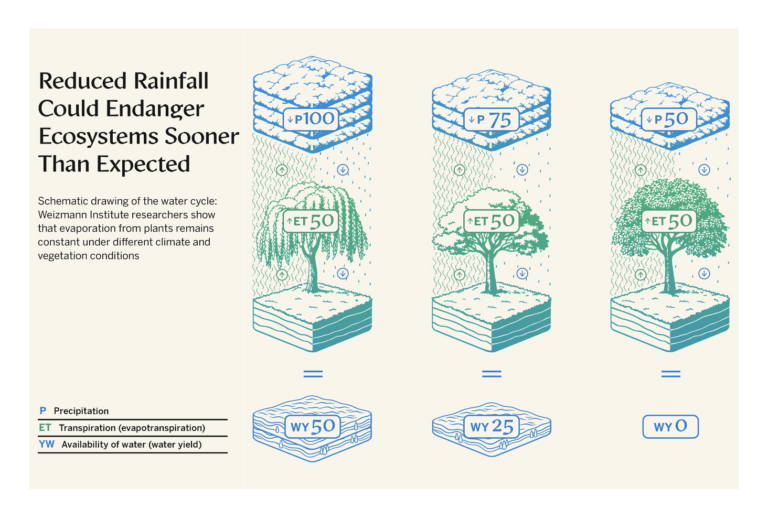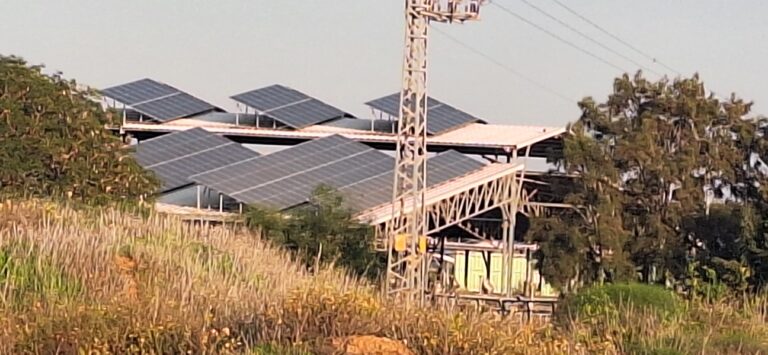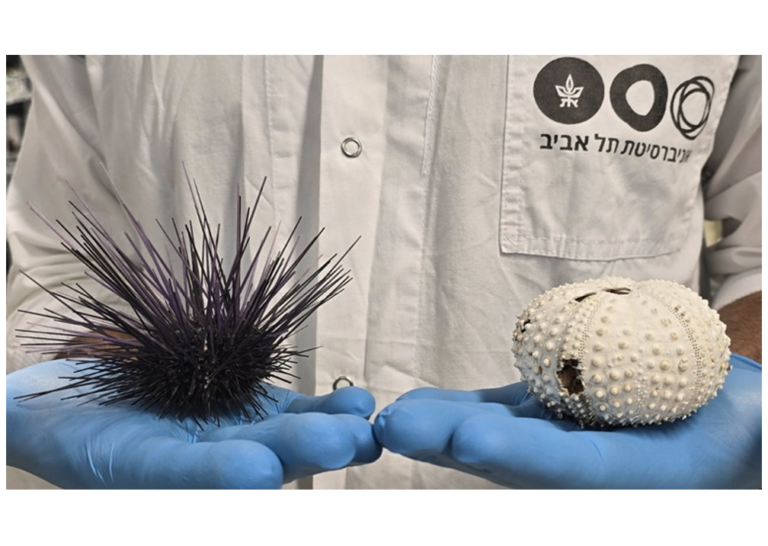Impact des forêts semi-arides sur le climat mondial : le Prof. Dan Yakir (Weizmann) reçoit le Prix d’Israël

[:fr]
Lors d’une cérémonie de Yom Haatsmaout, jour qui célèbre l’indépendance de l’Etat hébreu, le Professeur Dan Yakir de l’Institut Weizmann des sciences a reçu le prestigieux prix Israël pour ses travaux en géologie, en sciences de la Terre et en sciences de l’atmosphère, et pour ses avancées remarquables sur l’impact des forêts semi-arides sur le climat mondial.
« Au sein de la station d’observation qu’il a fondée dans la forêt de Yatir, le Pr Yakir explore les interactions entre la biosphère et l’atmosphère, en particulier l’influence de la végétation sur l’environnement et le climat », avait souligné l’ancien ministre israélien de l’éducation, Naftali Bennett.
Depuis près de deux décennies, le Pr Yakir, membre du Département des sciences de la Terre et des planètes de l’Institut Weizmann des sciences en Israël, exploite la station de Yatir, une pinède de pins d’Alep à la lisière du désert du Néguev. Cet écosystème semi-aride a constitué la base de nombreuses études climatiques de grande ampleur, permettant au Pr Yakir et à ses collègues d’utiliser la forêt comme modèle pour comprendre comment les plantes influencent leur environnement et le climat au sens large.

En mesurant les différences minimes de concentrations d’isotopes d’oxygène et de carbone lors de la photosynthèse des plantes, le Pr Yakir a découvert des processus chimiques uniques se déroulant à la fois dans les plantes et dans le sol et évaluer les mécanismes de stockage du carbone dans la biosphère. Ses données ont révélé comment ces échanges gazeux fluctuent en fonction des facteurs de stress environnementaux, pollution de l’air, vagues de chaleur et sécheresses… offrant ainsi aux décideurs un repère plus précis pour évaluer l’impact des activités humaines. Les travaux du Pr Yakir ont également joué un rôle essentiel dans la recherche sur le captage du carbone dans les forêts et dans la lutte contre la désertification dans les régions vulnérables.
Une récente étude du laboratoire du Pr Yakir, publiée dans Nature’s Scientific Reports, suggère que la plantation de forêts semi-arides dans deux zones auparavant négligées d’Afrique et d’Australie pourrait radicalement contrebalancer le réchauffement climatique induit par l’homme. De tels arbres pourraient absorber une quantité de carbone équivalent à 10% de l’absorption mondiale et aider à refroidir la Terre en six ans environ. L’étude, pilotée par le Dr. Gil Yosef, ancien élève du Pr Yakir, a montré que les arbres pouvaient collectivement favoriser la formation de nuages, en intensifiant l’humidité dans l’atmosphère au-dessus d’eux et en refroidissant la surface.
Estimant que le Pr Yakir avait mis au point des «méthodes innovantes» utilisant des isotopes stables et d’autres gaz à l’état de traces pour évaluer l’importance de la photosynthèse pour le climat mondial, le comité du Prix Israël l’a félicité pour la publication de processus critiques dans le «système plante-sol-atmosphère» et pour avoir fondé la station de recherche de Yatir.
« La station est intégrée à un réseau de stations mondiales dans différentes zones climatiques et fournit des données uniques sur l’impact d’un écosystème semi-aride sur le climat de la Terre dans le contexte du changement climatique », a déclaré le comité. « Le Prof. Yakir a grandement contribué à l’avancement de la science et aux relations entre la science et la société en Israël et dans le monde.”
Le Pr Yakir a reçu ce prix prestigieux lors d’une cérémonie annuelle à Jérusalem, le Jour de l’indépendance, aux côtés du Pr Adi Kimchi, son collègue de l’Institut Weizmann, qui se verra remettre le prix Israël pour les sciences de la vie. Le Pr Kimchi, membre du département de génétique moléculaire de l’Institut Weizmann.
Publication dans Nature Scientific Report, 17 janvier 2018
Traduction/adaptation Esther Amar pour Israël Science Info
[:en]
The Weizmann Institute’s Prof. Dan Yakir has won this year’s Israel Prize for Research in Geology, Earth Sciences and Atmospheric Sciences, for his groundbreaking insights into the impact of semi-arid forests on the global climate.
“At the station he founded in the Yatir Forest, Prof. Yakir explores the interactions between the biosphere and the atmosphere, especially the ways in which vegetation influences the environment and the climate,” Education Minister Naftali Bennett tweeted.
Prof. Yakir, a member of the Institute’s Department of Earth and Planetary Sciences, has been operating the Yatir Station—an Aleppo pine forest located at the edge of the Negev Desert—for nearly two decades. This semi-arid ecosystem has informed the basis for a wide range of broader climate studies, enabling Prof. Yakir and his colleagues to use the forest as a model for understanding how plants influence their larger environment and the climate.
By measuring tiny differences in oxygen and carbon isotope concentrations as plants undergo photosynthesis, Prof. Yakir has been able to uncover unique chemical processes that occur in both plants and soil, and assess carbon storage mechanisms in the biosphere. His data has revealed how these gas exchanges fluctuate in response to environmental stressors like air pollution, heat waves, and droughts, giving policymakers a more precise benchmark for assessing the impact of human activity. Prof. Yakir’s work has also played a critical role in promoting carbon sequestration in forests, as well as countering desertification in vulnerable regions.
A recent Yakir lab study, published in Nature’s Scientific Reports, suggested that planting semi-arid forests in two previously neglected areas of Africa and Australia could radically offset human-induced global warming. Such trees, the research found, could absorb an amount of carbon equivalent to 10% of the world’s uptake and help cool the Earth within around six years. The study, piloted by Prof. Yakir’s former student Dr. Gil Yosef, showed that the trees could collectively promote cloud formation—intensifying moisture in the atmosphere above them and cooling the surface below them.
Crediting Prof. Yakir for developing “innovative methods” that employ stable isotopes and other trace gases to assess the significance of photosynthesis to the global climate, the Israel Prize committee praised him for divulging critical processes in the “plant-soil-atmosphere system” and for founding the Yatir Research Station.
“The station is integrated in a network of global stations in different climactic zones and provides unique data on the impact of semi-arid ecosystem on the climate of the Earth under climate change,” a statement from the committee said. “Prof. Yakir has made a great contribution to the advancement of science and to relationships between science and society in Israel and around the world.”
Prof. Yakir will receive the prestigious award at an annual state ceremony in Jerusalem on Independence Day, alongside Weizmann Institute colleague Prof. Prof. Adi Kimchi—who will be awarded the Israel Prize for Life Sciences. Prof. Kimchi, a member of the Weizmann Institute’s Department of Molecular Genetics, is a pioneer in the field of programmed cell death and has developed RNA screening methods for identifying the agents responsible for a cell’s choice to live or die.
Prof. Yakir is supported by the Sussman Family Center for the Study of Environmental Sciences, the Cathy Wills and Robert Lewis Program in Environmental Science, and Dana and Yossie Hollander.
[:]







